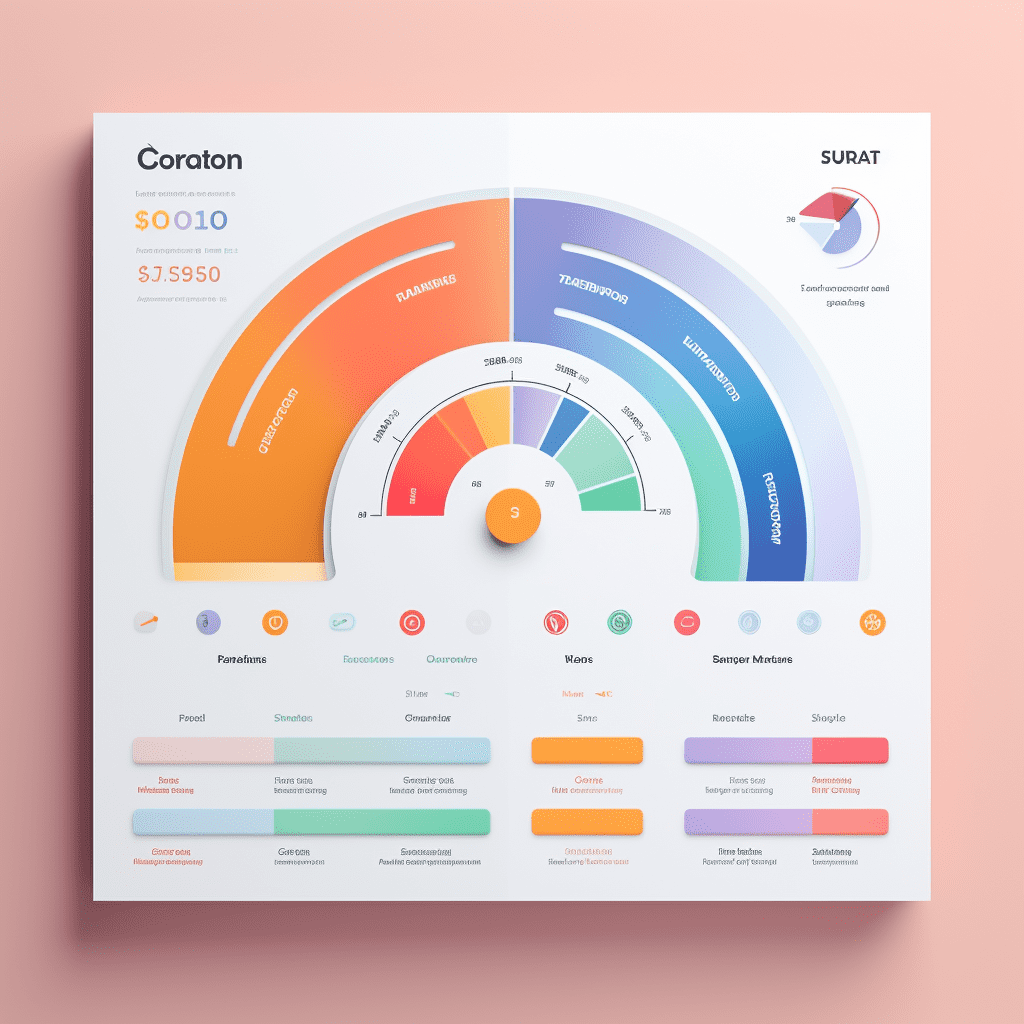Welcome to the complete guide on understanding credit scores and building good credit! Your credit score is like a financial superpower, and mastering it will open doors to fantastic opportunities. Let’s dive in and unravel the secrets of credit scores!
Outline
- Understanding Credit Scores
- Importance of Good Credit Scores
- Strategies to Improve Credit Scores
- Establishing Credit for Beginners
- Monitoring Credit Scores and Reports
- Dealing with a Poor Credit Score
- Maintaining Good Credit Over Time
- Addressing Credit Score Misconceptions
- Conclusion
- FAQs
- Case Analysis
- Checklist for Self-Reflection

Reading time: 10 minutes
1. Understanding Credit Scores
1-1. How Credit Scores Are Determined
Your credit score is a three-digit number that reflects your creditworthiness. It’s calculated based on several factors, including your payment history, credit utilization, length of credit history, types of credit, and recent credit inquiries. Each factor carries a different weight in the calculation, but timely payments and credit utilization are the most crucial ingredients.
1-2. Credit Score Ranges
Credit scores generally range from 300 to 850. The higher the score, the better your credit. Here’s how the scores are categorized:
- Poor: 300-579
- Fair: 580-669
- Good: 670-739
- Very Good: 740-799
- Exceptional: 800-850
2. Importance of Good Credit Scores
2-1. Financial Opportunities
A good credit score opens a world of financial opportunities. Lenders see you as a trustworthy borrower, leading to better loan terms and lower interest rates. Premium credit cards with amazing rewards become accessible too!
2-2. Non-Credit Aspects
Your credit score isn’t just about loans and credit cards. It can impact your job prospects and even rental agreements. Some employers run credit checks, and landlords often look at credit scores before approving your rental application.
3. Strategies to Improve Credit Scores
3-1. Timely Payments
Paying your bills on time is the golden rule. Just one missed payment can haunt your credit score for years. Stay consistent and consider setting up automatic payments or reminders.
3-2. Reducing Credit Utilization
Credit utilization is the percentage of credit you’re using. Aim to keep it below 30% to boost your score. Pay down debt and consider increasing credit limits to achieve this.
3-3. Diversifying Credit Accounts
Show lenders that you can handle different types of credit responsibly. A mix of credit cards, loans, and other accounts is a healthy sign, but be cautious with new accounts.
3-4. Limiting Hard Inquiries
Applying for credit too often results in hard inquiries, which can temporarily lower your score. Shop around for credit, but be mindful of multiple applications in a short period.
3-5. Dealing with Errors on Your Credit Report
Mistakes happen, and sometimes they end up on your credit report. Monitor your credit reports regularly and dispute any inaccuracies to maintain an accurate credit history.
4. Establishing Credit for Beginners
4-1. Secured Credit Cards
If you’re new to credit, secured credit cards can be your stepping stone. You provide a deposit as collateral, and the credit limit is typically equal to the deposit.
4-2. Co-signed Loans
Having trouble getting a loan? Consider asking someone with good credit to co-sign. Their good credit history can boost your chances.
4-3. Credit-Builder Loans
Designed for building credit, these loans work by depositing the borrowed amount into a savings account. As you make timely payments, your credit improves.
4-4. Becoming an Authorized User
Ask someone you trust to add you as an authorized user on their credit card. You benefit from their good credit habits, but ensure they have responsible credit usage.
5. Monitoring Credit Scores and Reports
5-1. Free Annual Credit Reports
You are entitled to one free credit report from each major credit bureau annually. Review them for accuracy and signs of identity theft.
5-2. Credit Score Monitoring Tools
Many credit card companies offer free credit score monitoring. Keep track of your progress and stay informed about changes.
5-3. Credit Monitoring Services
These services provide real-time alerts about changes to your credit reports. Some even offer identity theft protection.
6. Dealing with a Poor Credit Score
6-1. Communicating with Lenders
If you’re struggling with debt, talk to your lenders. They may be willing to work out repayment plans or other solutions.
6-2. Debt Consolidation Options
Consolidating multiple debts into one loan can simplify payments and potentially lower interest rates.
6-3. Credit Counseling
Working with a certified credit counselor can help you create a personalized credit repair plan.
7. Maintaining Good Credit Over Time
7-1. Good Credit Habits
Continue practicing timely payments and responsible credit usage to maintain good credit.
7-2. Monitoring Credit Reports
Regularly check your credit reports and address any discrepancies promptly.
7-3. Addressing Discrepancies
If you find errors on your credit reports, dispute them to keep your credit history accurate.
8. Addressing Credit Score Misconceptions
8-1. Multiple Credit Scores
Different lenders and models may yield slightly different credit scores.
8-2. Soft Inquiries vs. Hard Inquiries
Checking your credit report doesn’t impact your score (soft inquiry), but applying for credit does (hard inquiry).
9. Conclusion
Understanding credit scores is the key to financial success. By following these strategies and maintaining good credit habits, you’ll unlock a world of opportunities and build a secure financial future.
10. FAQs
10-1. How does my credit score affect my financial opportunities?
Your credit score plays a crucial role in determining your financial opportunities. A good credit score can help you qualify for better loan terms, lower interest rates, and premium credit cards with attractive rewards. It also impacts non-credit aspects like job prospects and rental agreements.
10-2. Can I improve my credit score quickly?
Improving your credit score is a gradual process that requires time and dedication. While there are no overnight fixes, you can start by making timely payments, reducing credit utilization, and disputing any errors on your credit report. Stay consistent, and over time, you’ll see positive changes.
10-3. Is it true that checking my credit report will lower my credit score?
No, checking your credit report will not lower your credit score. When you review your own credit report, it’s considered a “soft inquiry,” which has no impact on your score. Only “hard inquiries” from lenders, when you apply for credit, can temporarily affect your score.
10-4. What if I have a poor credit score? Can I still improve it?
Absolutely! Having a poor credit score doesn’t mean you’re stuck with it forever. Take proactive steps to address any outstanding debts, communicate with your lenders, and consider debt consolidation options. Working with a credit counselor can also help you create a plan to rebuild your credit.
10-5. How often should I monitor my credit score and reports?
It’s essential to monitor your credit regularly. You are entitled to one free credit report from each major credit bureau annually. Consider checking your credit reports at least once every four months. Many credit card companies also offer free credit score monitoring, which can help you stay updated on changes to your score.
11. Case Analysis: How Jane Improved Her Credit Score and Achieved Financial Success
Meet Jane, a young professional who was determined to take control of her financial future. Like many others, Jane knew that understanding credit scores was essential for achieving her goals, but she wasn’t sure where to start. Let’s take a closer look at Jane’s journey and the strategies she used to improve her credit score and achieve financial success.
Jane, a 28-year-old marketing specialist, had dreams of buying her first home and starting a small business.
However, she knew that achieving these goals required a good credit score.
Jane had a fair credit score of 670, and she wanted to boost it to the “good” range to qualify for better loan terms and lower interest rates.

11-1. Jane’s Starting Point
When Jane decided to take control of her credit score, she obtained her credit reports from all three major credit bureaus – Equifax, Experian, and TransUnion. She noticed a few errors in her credit reports, including an old collection account that was not hers. This discovery highlighted the importance of regularly monitoring credit reports for inaccuracies.
11-2. Strategy 1: Timely Payments and Reducing Credit Utilization
Jane made it a priority to pay all her bills on time to avoid any negative impact on her credit score. She set up automatic payments for her credit cards and loans to ensure she never missed a due date. By doing so, Jane improved her payment history, which accounted for 35% of her FICO® Score.
Additionally, Jane worked on reducing her credit card balances to lower her credit utilization ratio. She paid off some high-interest credit card debt and kept her utilization below 30%. This strategy improved her credit utilization, which contributed to 30% of her FICO® Score.
11-3. Strategy 2: Diversifying Credit Accounts and Limiting Hard Inquiries
Jane recognized the importance of having a diverse credit mix, so she applied for a small credit-builder loan and became an authorized user on her parent’s credit card. This move diversified her credit accounts and positively impacted her credit score.
To avoid unnecessary hard inquiries, Jane was cautious about applying for new credit. She only applied for credit when she needed it, such as when she wanted to finance her small business. By limiting hard inquiries, Jane protected her credit score from potential drops.
11-4. Strategy 3: Dealing with Errors and Monitoring Credit
Jane took immediate action to dispute the collection account that did not belong to her. She communicated with the credit bureaus and provided evidence to have it removed from her credit report. This dispute process was successful, and her credit score improved as a result.
To maintain her progress, Jane subscribed to a credit monitoring service. This service provided real-time alerts for any changes to her credit reports, giving her peace of mind and allowing her to address any discrepancies promptly.
11-5. Outcome: Achieving Financial Success
After implementing these strategies diligently, Jane’s credit score steadily increased. Within a year, her credit score improved from 670 to 730, entering the “good” credit score range. With her improved credit, Jane qualified for a mortgage with a lower interest rate, making her dream of owning her first home a reality.
Furthermore, Jane secured a small business loan with favorable terms to kickstart her entrepreneurial venture. The combination of timely payments, credit diversification, and addressing errors on her credit report propelled Jane toward financial success.
11-6. Conclusion: The Power of Understanding Credit Scores
Jane’s journey illustrates the transformative impact of understanding credit scores and taking proactive steps to build good credit. By following the strategies outlined in the comprehensive guide, individuals like Jane can unlock financial opportunities, achieve their dreams, and pave the way to a brighter financial future.
12. Checklist for Self-Reflection: Understanding Credit Scores
| Questions | Your Reflection | Suggested Improvement Strategies |
|---|---|---|
| How well do I understand my credit score and its impact on my financial life? | Read the article to gain insights into credit score fundamentals. | |
| Have I checked my credit reports for accuracy and errors? | Obtain free annual credit reports and dispute any inaccuracies. | |
| Do I make timely payments on all my bills and credit accounts? | Set up automatic payments to avoid missing due dates. | |
| What is my credit utilization ratio, and can it be improved? | Aim to keep credit utilization below 30% for better scores. | |
| Have I diversified my credit accounts to showcase responsible credit use? | Consider obtaining a credit-builder loan or becoming an authorized user. | |
| Am I cautious about applying for new credit to avoid hard inquiries? | Only apply for credit when necessary to minimize impacts. | |
| Do I regularly monitor my credit and address any discrepancies promptly? | Subscribe to a credit monitoring service for real-time alerts. |